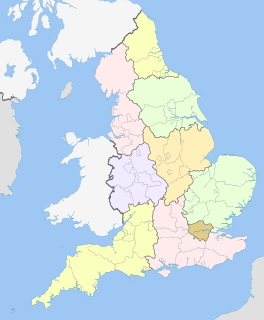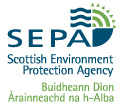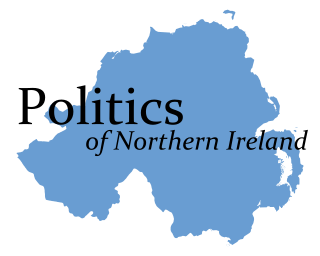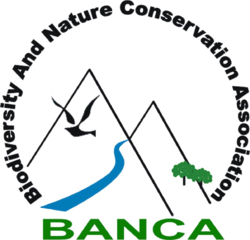
The Countryside Agency was a statutory body set up in England in 1999 with the task of improving the quality of the rural environment and the lives of those living in it. The Agency was formed by merging the Countryside Commission and the Rural Development Commission. Its powers were inherited from those bodies.
English Nature was the United Kingdom government agency that promoted the conservation of wildlife, geology and wild places throughout England between 1990 and 2006. It was a non-departmental public body funded by the Department for Environment, Food and Rural Affairs (DEFRA) and gave statutory advice, grants and issued licences.
This page gives an overview of the complex structure of environmental and cultural conservation in the United Kingdom.

The Department for Environment, Food and Rural Affairs (DEFRA) is the government department responsible for environmental protection, food production and standards, agriculture, fisheries and rural communities in the United Kingdom of Great Britain and Northern Ireland. Concordats set out agreed frameworks for co operation, between it and the Scottish Government, Welsh Government and Northern Ireland Executive, which have devolved responsibilities for these matters in their respective nations.

Ifor Huw Irranca-Davies is a Welsh Labour and Co-operative politician, who is Member of the Senedd for Ogmore and was previously the Member of Parliament (MP) for Ogmore from 2002 to 2016.
The Environment Agency (EA) is a non-departmental public body, established in 1995 and sponsored by the United Kingdom government's Department for Environment, Food and Rural Affairs (DEFRA), with responsibilities relating to the protection and enhancement of the environment in England.
The Rural Development Service (RDS) was formerly part of the UK Government's Department for Environment, Food and Rural Affairs (Defra). It ceased to exist on 1 October 2006 following the creation of Natural England.

In the United Kingdom, regional development agencies (RDAs) were nine non-departmental public bodies established for the purpose of development, primarily economic, of England's Government Office regions between 1998 and 2010. There was one RDA for each of the NUTS level 1 regions of England. Similar activities were carried out in Wales by the Welsh Government Department of Economy and Transport, in Northern Ireland by the Department of Enterprise, Trade and Investment and in Scotland by Scottish Enterprise and Highlands and Islands Enterprise.
Natural England is a non-departmental public body in the United Kingdom sponsored by the Department for Environment, Food and Rural Affairs. It is responsible for ensuring that England's natural environment, including its land, flora and fauna, freshwater and marine environments, geology and soils, are protected and improved. It also has a responsibility to help people enjoy, understand and access the natural environment.

The Rural Payments Agency (RPA) is an executive agency of the UK Department for Environment, Food and Rural Affairs (Defra). The RPA delivers the European Union (EU) Common Agricultural Policy (CAP) payments to farmers and traders in England, paying out over £2 billion in subsidies each year. The Agency managing more than 40 schemes, the largest of which the Basic Payment Scheme (BPS) paying more than £1.5 billion to around 105,000 claimants a year.

The Scottish Environment Protection Agency is Scotland’s environmental regulator and national flood forecasting, flood warning and strategic flood risk management authority. Its main role is to protect and improve Scotland's environment. SEPA does this by helping business and industry to understand their environmental responsibilities, enabling customers to comply with legislation and good practice and to realise the economic benefits of good environmental practice. One of the ways SEPA does this is through the NetRegs environmental guidance service. It protects communities by regulating activities that can cause harmful pollution and by monitoring the quality of Scotland's air, land and water. The regulations it implements also cover the storage, transport and disposal of radioactive materials.
The Sustainable Development Commission (SDC) was a non-departmental public body responsible for advising the UK Government, Scottish Government, Welsh Assembly Government, and Northern Ireland Executive on sustainable development.

The Department of Agriculture, Environment and Rural Affairs (DAERA) is a government department in the Northern Ireland Executive, the devolved administration for Northern Ireland. The minister with overall responsibility for the department is the Minister of Agriculture, Environment and Rural Affairs. The department was called the Department of Agriculture and Rural Development between 1999 and 2016 and was previously known as the Department of Agriculture for Northern Ireland or the Ministry of Agriculture. The department's Permanent Secretary is Denis McMahon
"Environmental Quality" is a set of properties and characteristics of the environment, either generalized or local, as they impinge on human beings and other organisms. It is a measure of the condition of an environment relative to the requirements of one or more species, any human need or purpose.
The National Bee Unit (NBU) runs Bee Health Programmes in England and Wales. The NBU consists of around 60 field-based Bee Inspectors and staff based in Sand Hutton, North Yorkshire.
The Scottish Government Rural Affairs, Environment and Services Directorates were a group of civil service Directorates in the Scottish Government until a December 2010 re-organisation.

Air pollution in the United Kingdom has long been considered a significant health issue. Many areas, including major cities like London are found to be significantly and regularly above legal and recommended levels. Air pollution in the UK is a major cause of diseases such as asthma, lung disease, stroke, and heart disease, and is estimated to cause forty thousand premature deaths each year, which is about 8.3% of deaths, while costing around £40 billion each year.

Biodiversity and Nature Conservation Association (BANCA) is a Burmese non-governmental organisation established in the capital city Yangon. The society aims to conserve natural diversity and promote awareness. It remains the leading force in Burma for biodiversity conservation and sustainable development.

The Natural Capital Committee (NCC) is an independent body set up in 2012, initially for a three-year period, to report to the UK Government and advise on how to value nature and to ensure England's ‘natural wealth’ is managed efficiently and sustainably. During its first term it produced three reports to government on the 'State of Natural Capital'. It has called on the Office for National Statistics to integrate the state of the country's natural assets into mainstream national accounting.










